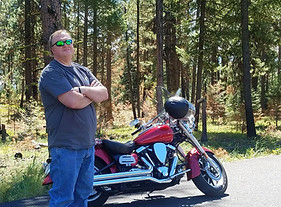
OREGON DISTRICT ATTORNEYS
ASSOCIATION

JIM CARPENTER
GRANT COUNTY DISTRICT ATTORNEY

WHY DID YOU BECOME A PROSECUTOR?
For 15 years I was in private practice. I mainly handled civil matters and generally did not do indigent defense criminal work. I would take on criminal cases as they came my way. While successful in criminal defense work, I always felt like I was a prosecutor pretending to be a criminal defense attorney. I haphazardly ran for district attorney positions in various counties over the years. In 2014, I decided to become serious about becoming a prosecutor, and ran a successful campaign in Grant County, where I lived and worked. I transferred my cases to other attorneys, gave away all my office things, sold my building, and never looked back. I’ve found where I fit in the justice system, and have never looked back.
WHAT IS THE MOST REWARDING PART OF YOUR WORK?
I enjoy my work as a prosecutor immensely. Our county is sparsely populated, and I know many of the people, both the law abiding and the not so law abiding. I find it very rewarding when someone who has made a mistake, is given a chance to figure out some things and get on track to becoming a good productive member of our community - and then do it. I do not get excited when people go to jail. I do not get excited when I win trials. I get excited when defendants succeed in breaking a cycle that they have been a part of, often since they were little children.
WHAT IS THE HARDEST PART OF YOUR WORK?
Sometimes a defendant has simply broken the trust placed in them too many times. There is little that can be done, except to get them off the street to keep them from harming others. These are the hard cases for me. I often feel that somewhere along the line, those defendants simply never had a chance to make it.
WHAT DO YOU WANT PEOPLE TO KNOW ABOUT YOU AND THE WORK YOU DO?
I once asked a criminal defense attorney that I respected to come work for me when I had an opening. I said that I thought they could do more for defendants from my side of the desk than they could from theirs. I hear the doubts. Even so, where possible, I try to structure sentences so that people who are working can continue to work. I try to keep people with their families. I try to allow defendants the chance to maintain their dignity and humanity to the extent that it is possible.
WHAT WOULD YOU LIKE THE COMMUNITY TO BETTER UNDERSTAND ABOUT THE CRIMINAL JUSTICE SYSTEM?
If there was one part of our justice system that I wished people understood better, it would be our juvenile system. The juvenile system has two parts: Dependency and delinquency. It is a total generality, but I typically describe it like this. Dependency is when the parenting is terrible or otherwise inadequate or lacking. Delinquency is when the child is engaged in criminal activity. Juveniles can often do terrible things to other juveniles or to other people. Victims often want justice as they envision it. Paying a debt to society in some kind of severe sanction. Victims are sometimes disappointed when that doesn’t happen and struggle to grasp that the purpose of the juvenile system is to correct behavior. A sanction can be part of that, but on the whole, the objective is to get the juvenile to change so that they can succeed as an adult.
DO YOU HAVE VOLUNTEER ACTIVITIES IN WHICH YOU PARTICIPATE?
Over the years, I’ve been involved in my community in many ways. I’ve served on the budget committee for the school board, on the planning commission for my city, on the board of property tax appeals for my county, etc. In 1996, I went to night school and became an EMT. For the next eight years, I was an active volunteer for our ambulance district. I love our county, and I am proud to work here.
My door is open, and I am always willing to meet with whoever would like to come by to talk about whatever.


